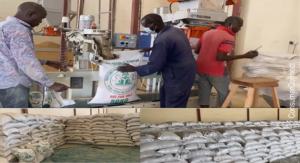 In a dedicated effort to alleviate the hardship faced by consumers, the Bola Ahmed Tinubu administration, in collaboration with the Federal Ministry of Agriculture and Food Security, is intensifying its efforts to ensure an adequate food supply in Nigeria.
In a dedicated effort to alleviate the hardship faced by consumers, the Bola Ahmed Tinubu administration, in collaboration with the Federal Ministry of Agriculture and Food Security, is intensifying its efforts to ensure an adequate food supply in Nigeria.
A recent update from Mr. Bayo Onanuga, the Special Adviser to the President on Information and Strategy, reveals that the government is in the final stages of releasing 42,000 metric tonnes (MT) of various food items to support the vulnerable population.
These food items, currently being bagged and stacked, will be delivered to the National Emergency Management Agency (NEMA) from seven strategically located reserves. Importantly, the government has emphasized that Nigerians will not be required to pay for the grain bags, as they will be provided free of charge.
Additionally, the Federal Government has announced plans to purchase 60,000 metric tonnes of milled rice from the Mega Rice Millers, further bolstering the food supply efforts. Senator Abubakar Kyari, the Honourable Minister for Agriculture, highlighted that the announcement alone has already led to a noticeable reduction in commodity prices across major grain markets in the country.
The government’s commitment to enhancing food production extends to the promotion of Dry Season Farming under the National Agricultural Growth Scheme Agro-Pocket (NAGS-AP) Project. The first phase of this initiative was launched in November 2023, with a focus on wheat cultivation across 15 wheat-producing states. The project covers an impressive 118,657 hectares, involving 107,429 farmers. The fields are flourishing, and the wheat harvest is expected to commence in a matter of weeks.
The Minister emphasized that the upcoming Phase 2 of the Dry Season Farming Project, which will encompass all 36 states of Nigeria and the Federal Capital Territory (FCT), will concentrate on rice, maize, and cassava cultivation. The ambitious targets include 250,000 hectares for rice production, involving 500,000 farmers and aiming for an output of 1 million metric tonnes of paddy rice. For maize, 55,000 hectares will be cultivated with 110,000 farmers, contributing an additional 165,000 metric tonnes to national maize production. Furthermore, 35,000 hectares will be designated for cassava cultivation, engaging 70,000 farmers and targeting a production of 525,000 metric tonnes of cassava.
To further support farmers, the NAGS-AP Project offers a 50% subsidy, with the Federal Government providing additional support to increase the aggregate subsidy to approximately 93%. The government is also collaborating with various governors who are demonstrating strong support to enhance the subsidy.
Moreover, the government is facilitating the upcoming phase of the program by providing solar-powered water pumps for irrigation, which will be deployed across the country.
By intensifying food supply initiatives and promoting agricultural growth, the Nigerian government aims to alleviate the hardships faced by consumers and contribute to a more sustainable and resilient food system nationwide.

